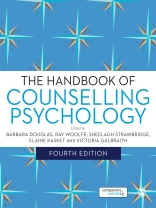This fourth edition provides the most comprehensive guide to the field of counselling psychology, exploring a range of theories and philosophical underpinnings, practice approaches and contexts, and professional issues. It has been updated to reflect current issues and debates and to map onto the training standards, and offers the ultimate companion for your journey through counselling psychology training and into the workplace.
New to the fourth edition:
- Chapters on: Person-Centred Therapy; Mindfulness; Neuroscience; Engaging with and Carrying out Research; Reflective Practice; International Dimensions; and Ecopsychology
- A companion website offering hours of video and audio, including conversations with counselling psychology practitioners and trainees, and articles, exercises and case studies
- Other new features include: Further Reading, ‘Day in the Life of’ dialogues with practitioners; Reflective Exercises, and Discussion Points, and new case studies.
Special attention has been paid to the topic of research, both as a theme throughout the book, and through four new chapters covering the use, carry out and publication of research at different stages of training and practice.
The handbook is the essential textbook for students and practitioners in the field of counselling psychology and allied health professions, at all stages of their career and across a range of settings, both in the UK and internationally.
Daftar Isi
Section I: Situating Counselling Psychology
Chapter 1: Mapping the world of helping: the place of counselling psychology – Ray Woolfe
Chapter 2: Science, craft and professional values – Sheelagh Strawbridge
Section II: Setting Out on the Journey
Chapter 3: Designing your life map – Leonie Sugarman
Chapter 4: Becoming a reflective practitioner – Mark Donati
Chapter 5: Engaging with academia and training programmes – Victoria Galbraith
Chapter 6: Entering clinical placements – Jane Lawrence
Chapter 7: Becoming a supervisee – Paul Hitchings
Chapter 8: Engaging with research – Isabel Henton
Section III: Finding Your Way
Chapter 9: Conceptualising in client work – Barbara Douglas
Chapter 10: Diagnosis and formulation in medical contexts – David Pilgrim
Chapter 11: Forming a relationship: a phenomenological encounter – Martin Milton
Chapter 12: Working with difference and diversity – Simon Parritt
Chapter 13: Developing self-care and resilience – Victoria Galbraith
Chapter 14: Carrying out research – Elaine Kasket
Chapter 15: Towards ethical maturity in counselling psychology – Elisabeth Shaw and Michael Carroll
Chapter 16: The interface between psychopharmacological and psychotherapeutic approaches – Diane Hammersley
Section IV: Encountering the Landscapes
Chapter 17: Person-centred therapy in the twenty-first century: growth and actualization – Andrew Hill and Mick Cooper
Chapter 18: The evolving world of cognitive and mindfulness-based interventions – Diane Sanders
Chapter 19: Psychodynamic interpersonal model – a perfect fit for Counselling Psychology? – Sarah Bartlett
Chapter 20: The Practice of therapeutic letter writing in narrative therapy – Anja Bjorøy, Stephen Madigan and David Nylund
Chapter 21: Neuropsychology and counselling psychology – Hamilton Fairfax
Chapter 22: Community psychology and the counselling psychologist – Paul Moloney
Chapter 23: Psychological practice in a time of environmental crisis: counselling psychology and ecopsychology – Martin Milton
Section V: Different Territories
Chapter 24: Counselling psychology and its international dimensions – Pam James
Chapter 25: Therapeutic work with children – Gail Sinitsky
Chapter 26: Counselling psychology in educational settings – Dee Danchev
Chapter 27: Counselling psychology in organizations: from problem fixing to emergence and growth – David Lane
Chapter 28: Working as a counselling psychologist in forensic contexts – Clive Sims
Chapter 29: Journeying through physical health – Rachel Davies
Chapter 30: Working as a counselling psychologist in primary care – Garrett Kennedy and Yesim Arikut-Treece
Chapter 31: The role of counselling psychology in secondary adult mental health care – Hamilton Fairfax
Chapter 32: Research: from consumer to producer – Terry Hanley, Edith Steffen and Denis O’Hara
Section VI: Becoming a Guide
Chapter 33: The transition from trainee to qualified counselling psychologist – Lewis Blair
Chapter 34: Leading and managing – Nicola Gale
Chapter 35: Becoming a supervisor – Ray Woolfe
Chapter 36: Becoming a trainer – Stelios Gkouskos
Chapter 37: Becoming an entrepreneur – practitioner – Caroline Vermes
Chapter 38: Researching across the career span – Elaine Kasket
Tentang Penulis
Sheelagh Strawbridge is a Chartered Psychologist and Registered Counselling Psychologist.












